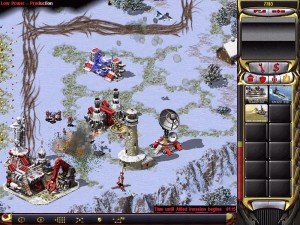Command & Conquer: Red Alert 2 is built on the Tiberian Sun engine. From a technical viewpoint the two games are all but similar, with the notable difference of the engine drawing 2D sprites for units in place of Tiberian Sun’s more complex voxels. But gameplay-wise it’s a slightly different experience. Unlike past C&C games, RA2 includes a tutorial Having identified Red Alert’s fast pace as what set it apart, the developers have modified the engine to recapture that pace. In accord with their philosophy that they want half-hour multiplayer games, not three-hour games, they have increased the speed at which units move and at which units and structures are created. By dividing the interface into separate tabs, they have increased the speed at which you can build, and by balancing buildings and units “high”, meaning in essence that all units have both rigid strengths and weaknesses, they ensure that battles are resolved quickly.
Stalin’s Ghost
In keeping with Westwood’s tradition of
providing amusingly cheesy narratives for their C&C games, Red Alert
2 will have you face off in yet another Soviet invasion as either the
Reds or Allies. Following the events in the first Red Alert, the Allies
have placed Romanov, supposedly a descendant of the Tsars, in charge of
Russia. Although he appears to be the perfect puppet (despite being an
outward Communist), he has his own agenda of revenge with his
psychically-endowed pet Yuri by his side, who reeks of pure
Rasputin-esque evil.
In contrast to the post-apocalyptic look
of Tiberian Sun, Red Alert 2 uses bright, vivid colors, including green
grass and trees galore. Furthermore, its structures and units have been
resized and are now significantly larger (while resolutions as high as
1024×768 provide more gaming real-estate overall).To make the graphics
more interesting, the single-player mission maps feature real world
locations with lots of recognizable landmarks. Among the US maps you’ll
find Washington DC, New York, Hawaii, the Virgin Islands, and the
Florida Keys, and among the foreign maps you’ll find the North Pole, the
Urals, Moscow and Paris. As always, going through the campaign can be
wicked fun.
Securing the perimeter
The game offers numerous and interesting
alternatives to the basic tank rush tactic. Unfortunately, none are
really as effective, and most will likely be used only in campaign game
circumstances that use scripting to reward different tactics. Buildings
can now be occupied, offering greater protection for concealed infantry
units. Functioning like other defensive weapons (such as flak guns and
Tesla coils), occupied buildings will shoot at whatever strolls down the
street. You will have to abandon the building if you want to direct
your fire at a specific enemy unit, however.
Each faction has a selection of common
and specialty units and structures available for construction. Soviet
infantry conscripts are cheap and expendable, while their Allied
counterparts are far better trained, deadlier, and more expensive. The
Grizzly and Rhino tanks are the MBTs (Main Battle Tanks) of the Allied
and Soviet armies, respectively.
Evil Genius
Climbing up the tech tree unveils more
diverse units, some which even yield a few interesting strategies in
those scenarios where rushes are rendered ineffective. Tesla technology,
which delivers devastating energy bolts, is central to the Soviet war
effort. The Tesla Coil can be a monster of defensive muscle, with a
large effective radius that fries most units before they can close. The
Allies have a few nice defensive tricks of their own, but enjoy good
mobility as well. Rocketeer units fly over any terrain and attack from
above. Transport helicopters and amphibious units can smash into enemy
lines.
Each side also has a small selection of
naval units and aircraft as is the norm, including cool Destroyers that
can perform shore bombardments. But included are a special brand of
tactical units and powers that are different for each side.Crazy Ivan is
a demolition unit, planting satchel charges that explode after a
certain number of seconds. You can place charges on units such as
infantrymen, dogs, and even cows. Yuri units exert an area of mind
control; enemy units within range fall under their spell.

Allies have spies, which can cause all
manor of havoc such as stealing money from refineries and resetting the
black fog of war over the world. Chrono Legionnaires teleport around the
battlefield, saving precious wear and tear on their legs. Mirage Tanks
turn into trees when standing still, waiting to ambush. Americans can
generate paratroopers on a regular basis, dropping them where desired.
Germany can deploy their latest tank destroyers, and the British deploy
snipers. Korea uses a more advanced version of the Harrier, and Russia
features their aforementioned Tesla Tank. Cuba, Libya, and Iraq employ
Terrorists, Demolition Trucks, and Desolators respectively.
A lot of concern was raised on whether
Westwood can better the formula while still keeping that retro C&C
feel intact, which is exactly what they’ve accomplished with RA2.
Although central to success is the usual tank rush preceded by a speedy
hoarding of resources and the churning out of units, the amount of new
toys as well as two finely crafted campaigns ensure the fun lasts.
.png)








0 Comment:
Post a Comment